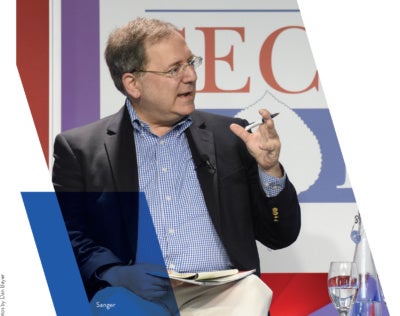US Senators Chris Coons and Cory Gardner had recently returned from trips to Asia and Africa and were deeply concerned about what they perceived as receding American influence abroad. At the Aspen Strategy Group’s 2019 Summer Workshop—a bipartisan community of 70 leading foreign policy experts cochaired by former Secretary of State Condoleezza Rice and Harvard University Professor Emeritus Joseph Nye, and directed by Harvard University Professor Nicholas Burns, and Anja Manuel, a former State Department official—the senators described sprawling infrastructure projects sponsored by Beijing and the vital importance of China to economies worldwide. Heads nodded in agreement as a central question emerged against the backdrop of expanding Chinese influence: Is the United States destined for cooperation with China—or for confrontation?
 Over the last 36 years, the Aspen Strategy Group has gathered for private, resolutely nonpartisan discussions to address the most important challenges facing the United States. A breakdown of consensus over strategy in the twilight of the Cold War prompted Joseph Nye, former Secretary of Defense Bill Perry, and former National Security Advisor Brent Scowcroft to found the Aspen Strategy Group in 1984 for behind-the-scenes conversations away from Washington’s political climate. Among the earliest congressional participants were Senator Sam Nunn, future Secretary of Defense Les Aspin, future Vice President Dick Cheney, and Senator John Warner. “This did not prevent expression of sharp differences of opinion,” Nye recalls. But, he adds, it created an environment devoid of partisan attacks where participants could openly share their opinions—and change their minds—about America’s best interests at home and abroad.
Over the last 36 years, the Aspen Strategy Group has gathered for private, resolutely nonpartisan discussions to address the most important challenges facing the United States. A breakdown of consensus over strategy in the twilight of the Cold War prompted Joseph Nye, former Secretary of Defense Bill Perry, and former National Security Advisor Brent Scowcroft to found the Aspen Strategy Group in 1984 for behind-the-scenes conversations away from Washington’s political climate. Among the earliest congressional participants were Senator Sam Nunn, future Secretary of Defense Les Aspin, future Vice President Dick Cheney, and Senator John Warner. “This did not prevent expression of sharp differences of opinion,” Nye recalls. But, he adds, it created an environment devoid of partisan attacks where participants could openly share their opinions—and change their minds—about America’s best interests at home and abroad.
What started as a bipartisan gathering of 30 former government officials, academics, journalists, business, and nonprofit experts exploring important issues between hikes, rafting trips, and cookouts has grown significantly. Over the years, a considerable number of members of the group went on to serve as secretaries of state and defense, national security advisors, and other senior positions in both Republican and Democratic administrations. Several officials later stated that their policy views were strongly influenced by the discussions in Aspen, with one official saying he learned more from his four days in Aspen than his four years in the White House. “From a focus on arms control during the Cold War to today’s focus on economic, environmental, and social issues, no other group tackles challenges like the Aspen Strategy Group,” says Senator Dianne Feinstein, who joined the ASG in 1997.
The Aspen Strategy Group traditionally engages with the public through collective statements on pressing issues and its annual book, which highlights key papers and findings from the Summer Workshop. These products have been particularly valuable to members of Congress and the administration. But until last year, a way to open the doors and share these insights with the broader community was just over the horizon.
 In 2019, the ASG assumed leadership of the Aspen Security Forum, an annual three-day public conference hosted on the Institute’s historic Aspen Meadows campus in Colorado. Founded in 2010, the Aspen Security Forum has evolved over the past 10 years from an exclusively homeland security–focused event to encompass the breadth of threats facing the United States and its allies around the globe. Like the Aspen Strategy Group, it offers a unique combination of substantive, and sometimes heated, discussion with a chance to build relationships across political and international borders.
In 2019, the ASG assumed leadership of the Aspen Security Forum, an annual three-day public conference hosted on the Institute’s historic Aspen Meadows campus in Colorado. Founded in 2010, the Aspen Security Forum has evolved over the past 10 years from an exclusively homeland security–focused event to encompass the breadth of threats facing the United States and its allies around the globe. Like the Aspen Strategy Group, it offers a unique combination of substantive, and sometimes heated, discussion with a chance to build relationships across political and international borders.
Over the years, the Aspen Security Forum has enabled leaders to examine and debate the most pressing issues of the day, while connecting on a human level. At the 2017 forum, Chief Washington Correspondent for The New York Times David Sanger spoke with former Trump Advisor for Homeland Security and Counterterrorism Tom Bossert about global cyber and biochemical threats facing the United States. They followed their conversation with a fishing trip later that afternoon. “He had his complaints about how the Times was covering the Trump administration, and I had my complaints about how Trump deals with the media,” Sanger remembered. “We both complained about how hard it was to pull trout out of the Roaring Fork River.”
Bossert was also one of 10 people in daily talks with the president about the future of America’s Afghanistan policy. During the 2017 and 2018 forums, he developed a close friendship with Hamdullah Mohib, the then-ambassador of Afghanistan to the United States who now advises President Ashraf Ghani on national security. “I built a strong, informal, casual relationship with Hamdullah in Aspen,” Bossert said. “It was invaluable to sit on the lawn and just talk for two or three hours.” Bossert credits his relationship with Hamdullah for informing White House policy discussions about Afghanistan, and the two have stayed in regular touch since their time in Aspen.
Last summer, over 500 participants joined senior government and international officials, including NATO Secretary-General Jens Stoltenberg, to discuss Vladimir Putin’s revanchist agenda in Europe, the emergence of space as the battleground of the future, and proliferating cyber threats. As at the Aspen Strategy Group’s Summer Workshop, Washington’s future relationship with Beijing remained front and center. Phillip Davidson, the commander of US Indo-Pacific Command, summarized the thoughts of many when he said, “I consider China to be the greatest long-term strategic threat to the United States and the international order.”
The Aspen Strategy Group’s public and private discussions about China yielded key insights that were distilled into its latest policy book, The Struggle for Power: U.S.—China Relations in the 21st Century, which is now available to the public on the ASG website. When this book launched at an event in January, Condoleezza Rice and Nicholas Burns discussed one distinct advantage the United States has over China: Washington has allies, while Beijing does not. “I hope America doesn’t lose sight of its extraordinary achievements over the past 75 years,” said Rice, while concluding that these alliances are essential to ensuring America’s advantage for years to come.
Underscoring Rice’s comments are the Aspen Strategy Group’s Track II dialogues, which convene American decision makers with their counterparts abroad for off-therecord conversations. The ASG hosted its first such dialogue in 2002 with India and has since expanded the series to include Brazil, China, and transatlantic partners in Europe. Together, delegations meet regularly to identify areas of concern and opportunity in each bilateral relationship.
The future holds great promise, now that the Summer Workshop, Track II dialogues, and Aspen Security Forum are aligned. The Aspen Strategy Group’s vision, now for 2021, is to host the Summer Workshop and Aspen Security Forum consecutively, allowing leaders to share their ideas with multiple audiences while deepening relationships in both private and public settings. The group will call on its Track II and Summer Workshop international participants and draw inspiration from other major conferences to make the Aspen Security Forum a venue for global leaders to discuss the most challenging issues of the moment. And the Aspen Strategy Group leadership plans to surround these events with smaller on- and off-the-record gatherings to ensure a continuity of conversation beyond the marquee summits.
The road ahead for the Aspen Strategy Group and the Aspen Security Forum is, however, not without challenge. The impact of Covid-19 and measures to combat the virus prompted leadership to make the difficult decision to shift the 2020 Aspen Security Forum online. This alternative digital initiative, presented by the Aspen Strategy Group, will continue the vital discussions hosted each summer in Aspen. “The coronavirus pandemic and global economic crisis are perhaps the greatest challenge to the United States since the Second World War,” Burns says. And they are interconnected: “We believe our mission of bringing together Republicans and Democrats in nonpartisan dialogue and debate is now more important than ever. So we plan to use our online programming this summer and autumn to help design an effective US response by our government and society to these difficult twin challenges.” No matter the obstacle, the Aspen Strategy Group will continue to connect both conservative and liberal experts to chart a course forward to ensure America’s best interests at home and abroad.
John P. Hogan is the associate director of public initiatives for the Aspen Strategy Group. aspensecurityforum.org